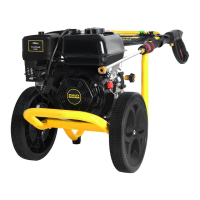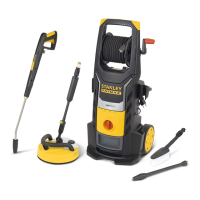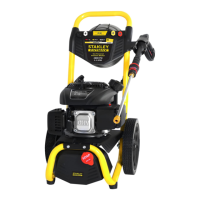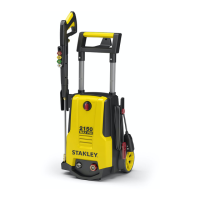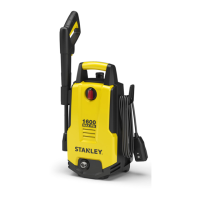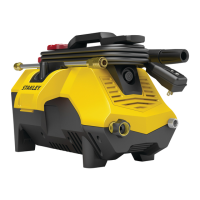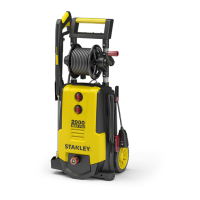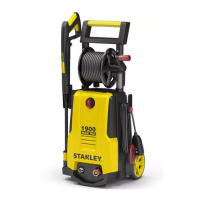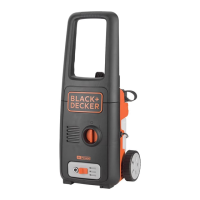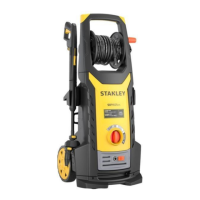11
ENGLISH
(Original instructions)
will stand upright on the battery pack but may be easily
knockedover.
Transportation
WARNING: Fire hazard. Transporting batteries can
possibly cause fire if the battery terminals inadvertently
come into contact with conductive materials. When
transporting batteries, make sure that the battery
terminals are protected and well‑insulated from
materials that could contact them and cause a short
circuit. NOTE: Lithium‑ion batteries should not be put in
checkedbaggage.
STANLEY FATMAX batteries comply with all applicable
shipping regulations as prescribed by industry and legal
standards, which include UN Recommendations on the
Transport of Dangerous Goods; International Air Transport
Association (IATA) Dangerous Goods Regulations; International
Maritime Dangerous Goods (IMDG) Regulations; and the
European Agreement Concerning The International Carriage
of Dangerous Goods by Road (ADR). Lithium-ion cells
and batteries have been tested to section 38.3of the UN
Recommendations on the Transport of Dangerous Goods
Manual of Tests andCriteria.
In most instances, shipping a STANLEY FATMAX battery pack
will be excepted from being classified as a fully regulated
Class9Hazardous Material. In general, only shipments
containing a lithium-ion battery with an energy rating greater
than 100Watt Hours (Wh) will require being shipped as
fully regulated Class9. All lithium-ion batteries have the Wh
rating marked on the pack. Furthermore, due to regulation
complexities, STANLEY FATMAX does not recommend air
shipping lithium-ion battery packs alone regardless of Wh
rating. Shipments of tools with batteries (combo kits) can be air
shipped as excepted if the Wh rating of the battery pack is no
greater than 100Wh.
Regardless of whether a shipment is considered excepted
or fully regulated, it is the shipper's responsibility to consult
the latest regulations for packaging, labeling/marking and
documentationrequirements.
The information provided in this section of the manual is
provided in good faith and believed to be accurate at the time
the document was created. However, no warranty, expressed
or implied, is given. It is the buyer’s responsibility to ensure
that its activities comply with the applicableregulations.
Storage Recommendations
1. The best storage place is one that is cool and dry away
from direct sunlight and excessive heat or cold. For
optimum battery performance and life, store battery packs
at room temperature when not inuse.
2. For long storage, it is recommended to store a fully
charged battery pack in a cool, dry place out of the
charger for optimalresults.
NOTE: Battery packs should not be stored completely
depleted of charge. The battery pack will need to be
recharged beforeuse.
Labels on Charger and Battery Pack
In addition to the pictographs used in this manual, the
labels on the charger and the battery pack may show the
followingpictographs:
L
Read instruction manual beforeuse.
p
See Technical Data for chargingtime.
q
Do not probe with conductiveobjects.
r
Do not charge damaged batterypacks.
s
Do not expose towater.
t
Have defective cords replacedimmediately.
u
Charge only between 4˚C and 40˚C.
v
Only for indooruse.
x
Discard the battery pack with due care for
theenvironment.
y
Charge STANLEY FATMAX battery packs only with
designated STANLEY FATMAX chargers. Charging
battery packs other than the designated STANLEY
FATMAX batteries with a STANLEY FATMAX
charger may make them burst or lead to other
dangeroussituations.
z
Do not incinerate the batterypack.
B
USE (without transport cap). Example: Wh rating
indicates 108Wh (1battery with 108Wh).
A
TRANSPORT (with built-in transport cap). Example:
Wh rating indicates 3x 36Wh (3batteries of 36Wh).
Charging a Battery
STANLEY FATMAX chargers are designed to charge STANLEY
FATMAX batterypacks.
• Plug the charger into an appropriateoutlet.
• Insert and fully seat battery pack. Green charging light will
continuously blink whilecharging.
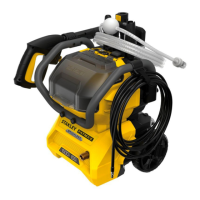
